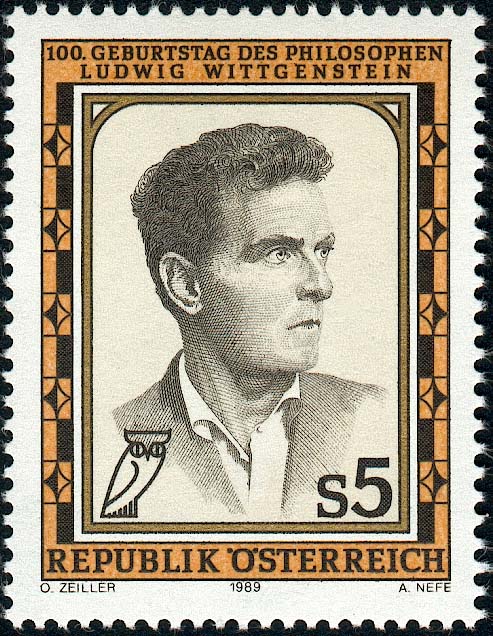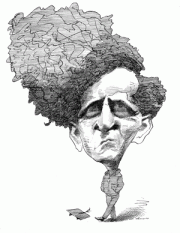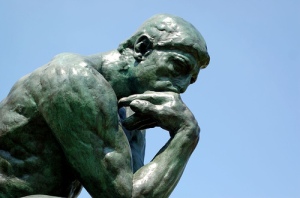Stuck between two things
Philosophy is the battle against the bewitchment of our intelligence by means of our language. PI 109
Reading a lot of Wittgenstein at the moment. A moral from the Philosophical Investigations:
 Many problems come from our wanting to treat something as something it is not. For Wittgenstein, this was treating the meaning of words as something in some special realm, or treating thoughts as mental objects to which only I have access.
Many problems come from our wanting to treat something as something it is not. For Wittgenstein, this was treating the meaning of words as something in some special realm, or treating thoughts as mental objects to which only I have access.
The solution is to look at how we use words and what actually goes on and figure out from that how to treat things. Starting with an idea of what something is and then forcing the thing into that idea only leads to problems.
The same basic problem is faced with the incursion of the scientific attitude into non-scientific areas of language.
We want to treat depression as a medical problem, with an entirely biological explanation, but this makes the fact that we often “catch” depression from events in our life seem quite odd – (“queer” in Wittgenstein’s terms).
We want to treat religion as making factual claims about the universe, but this makes the fact that people are converted to a religion and not just educated about it seem odd.
We want to believe that our experience takes place in the brain, but that makes the shared world we live in an odd place.
We want there to be a firm separation between subjective and objective so that we can put everything on the objective side in a bag marked truth and discard everything else as lightweight. But when we look at the world we find it much harder to fit things into the bag. What, for example, is money? Without our “subjective” acceptance of its value, the objective marks on paper or gold atoms are literally worthless.
I haven’t really understood it yet, but I think I’m on the right track.
The philosopher
 Philosophy is more rubbish than science by a mile.
Philosophy is more rubbish than science by a mile.
The first problem is how they fill their time – writing peer-reviewed papers, spending time researching and going to conferences, teaching undergraduates. What use is it for most people? Greatest philosophical breakthrough of the last 20 years anyone?
The extreme positions have already been plotted. There are no discoveries in philosophy.
While their modus operandi mimics science, they are so scared of the rigor, certainty and force of scientific argument, that they keep themselves hidden, quiet little mice of academia, making sure not to rock the boat and draw attention. Tending to a career.
Worst of all, they come up with words like ontology and epistemology (will write next), they debate the hard problem of something everyone does all the time. They use words which ring-fences unfathomable complexity; minute detail. (Such that surely only a professional philosopher could comprehend, of course.)
Well guess what? Philosophy is a science as much as documentary making or being a novelist.
There is the same difference between academic philosophers and philosophers as between english literature professors and novelists (of course they do sometimes overlap).
The subject matter is philosophy. Books and essays and arguments about abstract, conceptual matters.
Except there are no bastard philosophers to be seen. Plenty of novelists, but no philosophers. They used to exist. But now they don’t. They got swallowed up by the scientific attitude (and the old philosophers didn’t help by being utterly impenetrable).
Here is the definition. Philosophy is creative abstract thought. It is that easy.
Is there a need for philosophy? Doesn’t academic theory of philosophy that university professors do look pretty similar?
The old philosophers failed not in intent or genius but in accessibility. The biggest criticism of the best of them was arrogance and elitism. They created no vehicle for their ideas to get outside of a select few (perhaps they were squashed by religion).
My idea of philosophy is obviously a romantic ideal. Don’t you think its worth aiming for?
Faith, religious and non-religious, cannot defend itself from science (or rather in more confusing and accurate terms, all of a certainty’s defences against science are founded on connected certainties). Philosophy should be the buffer between science and life. Philosophy should be telling science to back off.
How do you interest a scientist in ontology?
Ok. It’s a bad word. Please keep reading. Ontology is a terrible word. Rings of something incredibly complicated. (see comments on philosophers, edited out of previous version).
If you feel like writing. Here’s a question. If not, read on…

The question
The question you need to ask yourself is simply this. What is real? What is reality like? If you had to describe it objectively, capturing everything, what would you say?
Scientists are a clever bunch. All my criticism is of science applied to the wrong things, not science as used in the right way.
 The problem, in an impossibly abstract sense, is that scientists work on an incoherent ontology. It is not scientists fault in a way. They are by definition not interested in a conceptual argument.
The problem, in an impossibly abstract sense, is that scientists work on an incoherent ontology. It is not scientists fault in a way. They are by definition not interested in a conceptual argument.
In the most basic sense an ontology is just an abstract conceptual description of what is real. Science does deal with defining what is real, but only after you have decided what kind of questions you need answering, and what importance the answers have.
It is not in the interest of science to question the conceptual system in which their investigation takes place. The inevitable answer is that science does not provide the whole answer.
Scientists themselves don’t seem to believe that they have all the answers. They happily use concepts that lie outside of scientific investigation – the purpose of the investigation, for example. Because the ontology is everything it obviously decides the importance of everything, thats all.
Language does not comply to the laws of physics
Ontologies can be really easy.
 I’ll try an ontology from the most coherent materialist angle possible:
I’ll try an ontology from the most coherent materialist angle possible:
Everything that happens is made of matter. Matter can be explained by the rules of physics, chemistry, biology and cosmology.
One part of the material world is brains and nervous systems in humans.
Living brains and nervous systems in humans generate a complex, communal form of life, experienced by each living and awake human.
Every fact about the world only matters to us insomuch as it is part of the brain-created, conscious, conceptually organized life we live. This life takes place in the material world, but a material world overlayed with a complex network of interconnected concepts which are shared by massive groups, cultures, societies and populations of humans. You obviously cannot see these in the normal sense.
Of course everything real is a concept that is made of something. But tell me how where a concept is, is the most useful part of the explanation?
Lets try one. The concept of the novel. All the paper and ink in books and led and computer chip as well, on which they are being written. And add the interconnected neurons of novelists – the ones that do the thinking, and the writing, and the history and criticism of novels and the great novelists, and all the reading.
The question is, so what? I know what a novel is. There is no scientific discovery about paper or LEDs that will help me explain what a novel is.
And here we hit the sticky point. We get confused talking about our own brains. There are discoveries about the brain that are obviously yet to be made. The question is the most useful explanation of how the neurons are connected.
I would argue that the scientific explanation is not very useful in conceptual matters. The best, and most comprehensive possible answer of what the neurons are doing, the organisation of the atoms, is the description of the practice of reading and writing novels. This is inevitably an expansive inquiry based on finding out about the connected concepts, practices and ideas – the grammar of our form of life, to put it in Wittgenstein’s terms.
You explain what a novel is by explaining what reading and writing are, you explain narrative and characterization, the history of novelists, the science of printing and of neurobiology, the anthropology of storytelling. All these things and more give the best, most complete explanation of the novel. (the words explanation and description here mean the same thing).
How can you say that life is not real?
 It makes no sense to say that life is not real, but that is exactly what many people seem to believe.
It makes no sense to say that life is not real, but that is exactly what many people seem to believe.
Basically, we all bloody well know that we are conscious. That we are all living lives.
There is all this debate about the science of consciousness. We discovered consciousness long ago, but have yet failed to comprehend the implications of the discovery.
We know that our brains do subjectivity, that this is “what it is like to be your brain and nervous system”. We have known the ontology for a long time. But who would herald the discovery of something they were already plainly aware of.
No. We found out that conscious life took place in the brain, and not for example, the lungs. But we were not particularly interested. The logical conclusions are still sinking in.
These thoughts are so far from the scientist’s interests that it is clearly possible to discount them entirely.
The scientist’s question – “how do I find out what is real?”
The scientist’s answer – “it’s what I do”.
1.What is real? Come on you scientists and atheists and rationalists of all shapes and sizes. For the sake of nothing but inquiry and curiosity, indulge me in this trivial matter. What do you think, in the most abstract terms you can face using, is real? What ontology are you working from? Do it in 140 if you like.
The philosopher
 You might see by now that this blog is probably more interested in philosophy than science. Back Off Science refers as much to philosopher’s captivation as science’s error – although both are clearly important.
You might see by now that this blog is probably more interested in philosophy than science. Back Off Science refers as much to philosopher’s captivation as science’s error – although both are clearly important.
At the end of the day, philosophy should not have that much to do with science. It has been polluted horribly by wanting to be in the same family.
Philosophy is basically just abstract creative writing, talking, arguing and thinking.
And if you’ll pirouette with the analysis, that makes what philosophers are doing now just very boring abstract ideas – written for no-one but the author and a tiny group of peers, using impenetrable language with no interest whatsoever in actually changing how people think or act.
There is still a place for philosophy in our rationalist age, and still a pulse in its coma riven body. It is needed now more than ever.
1 comment